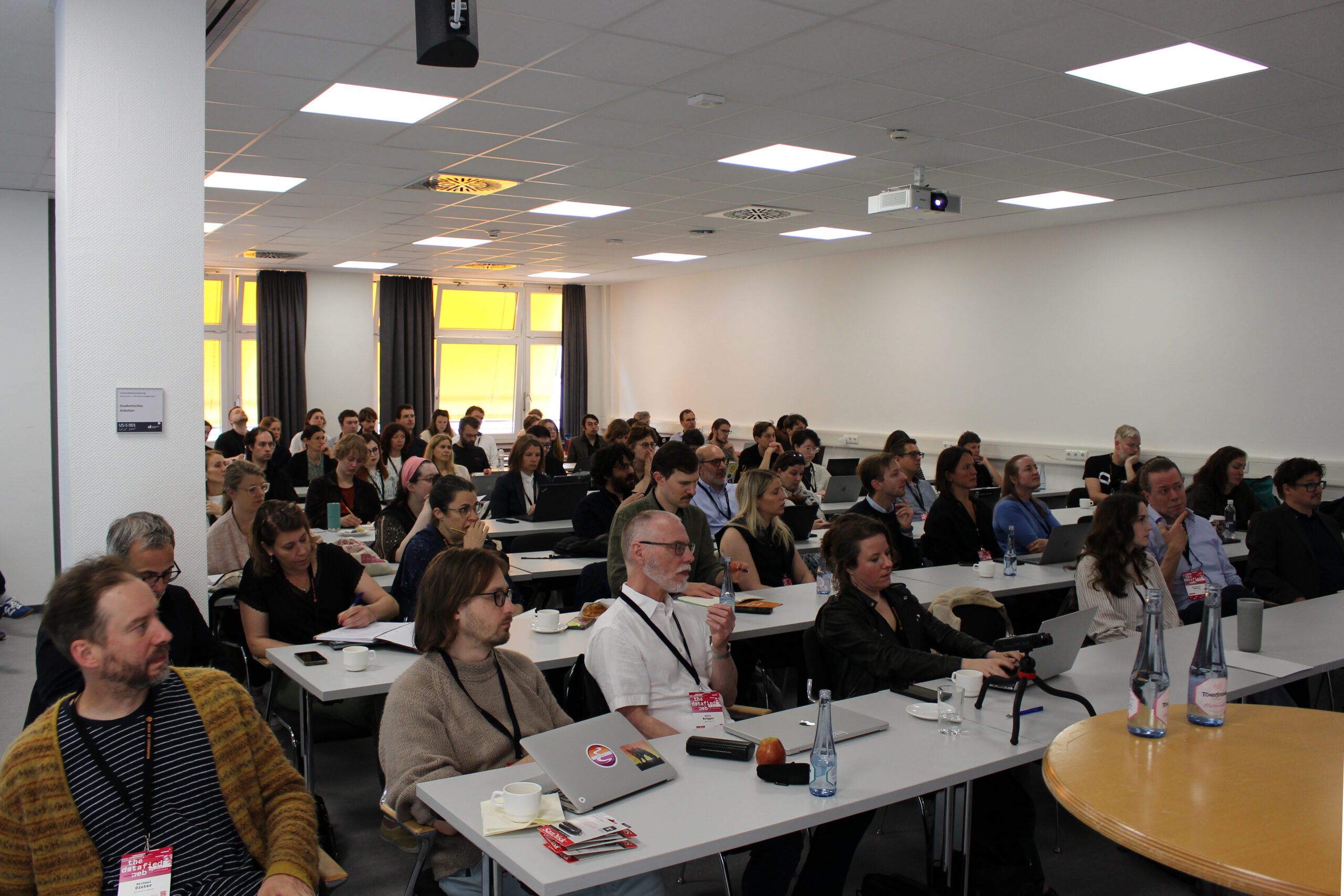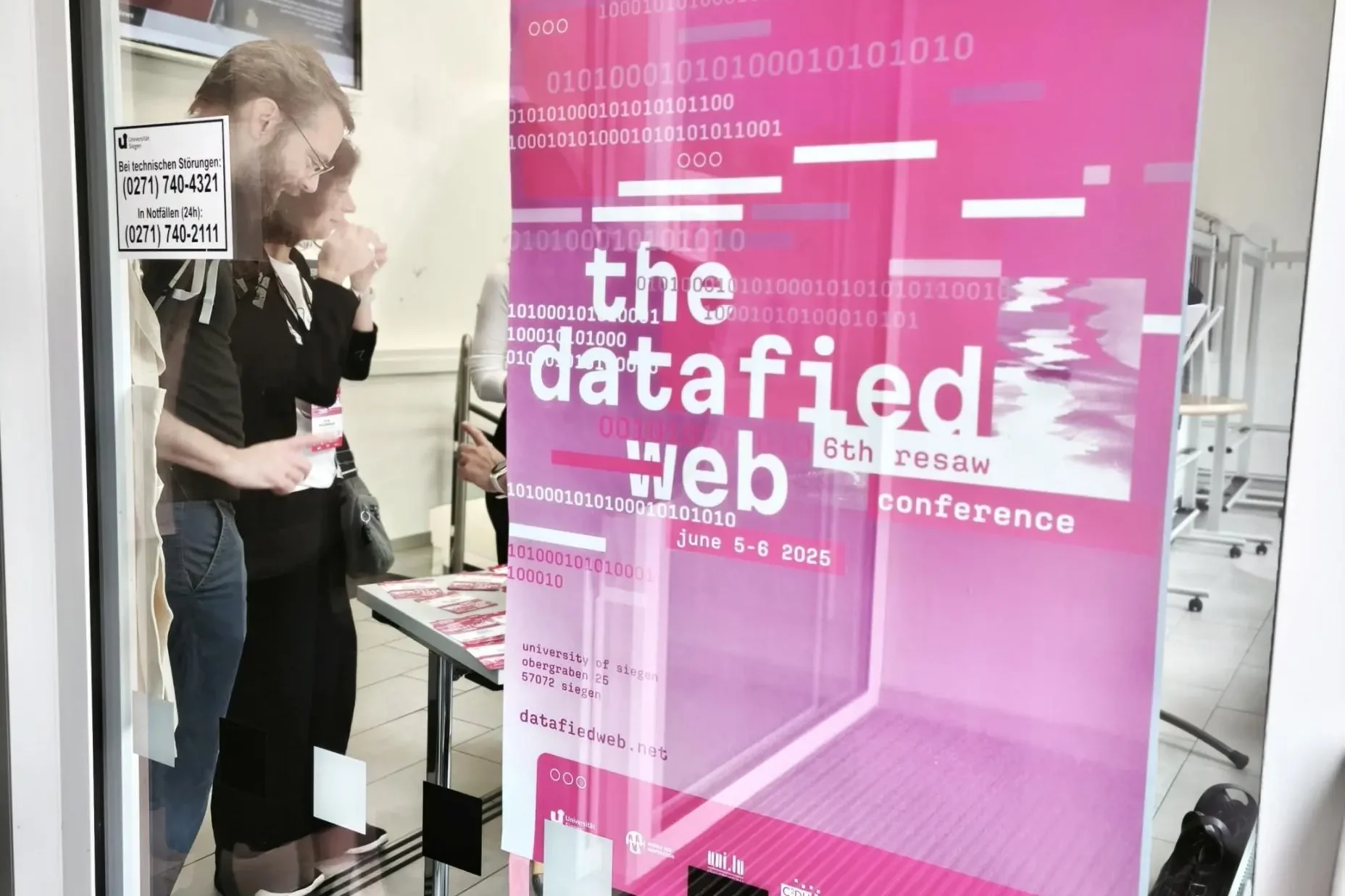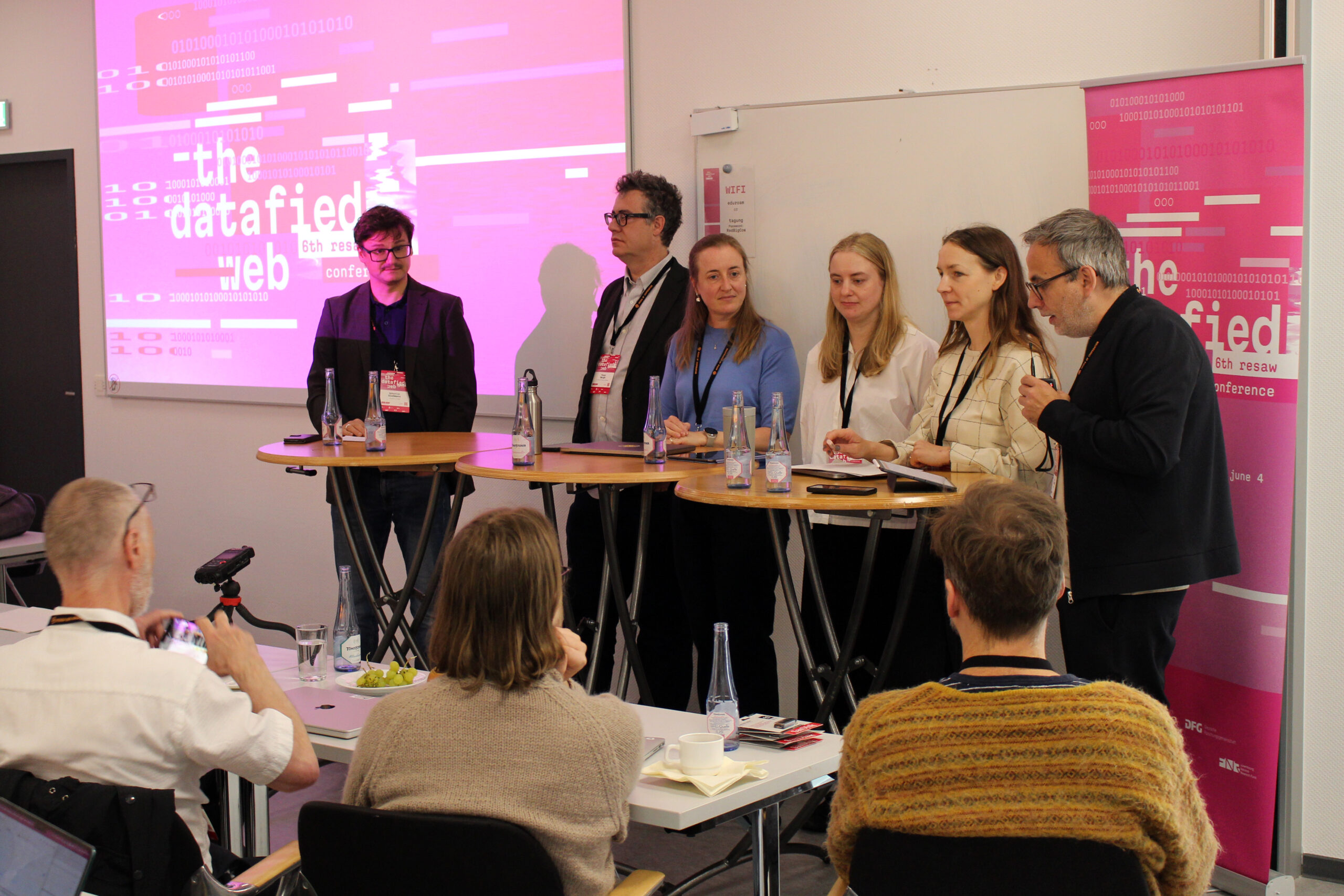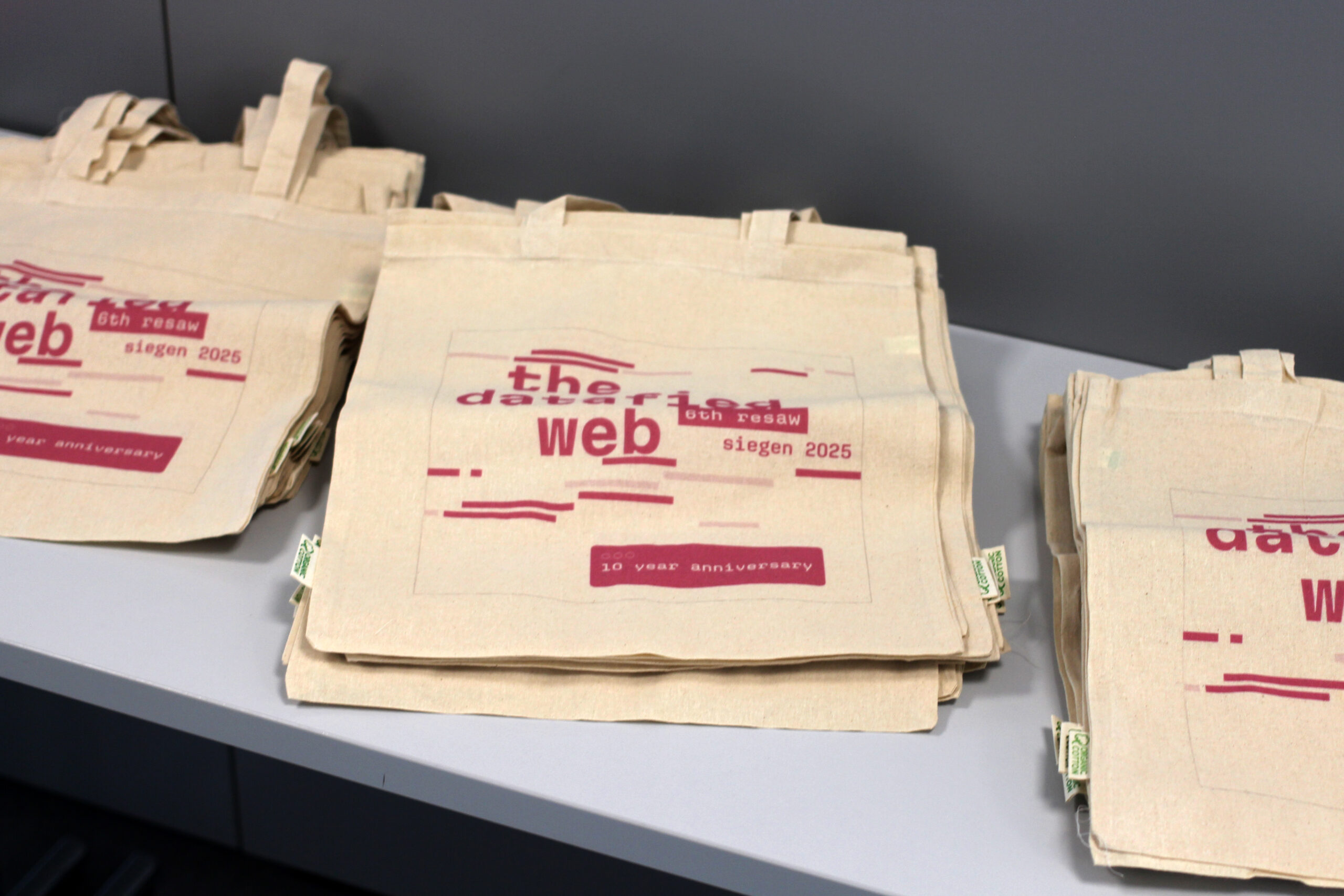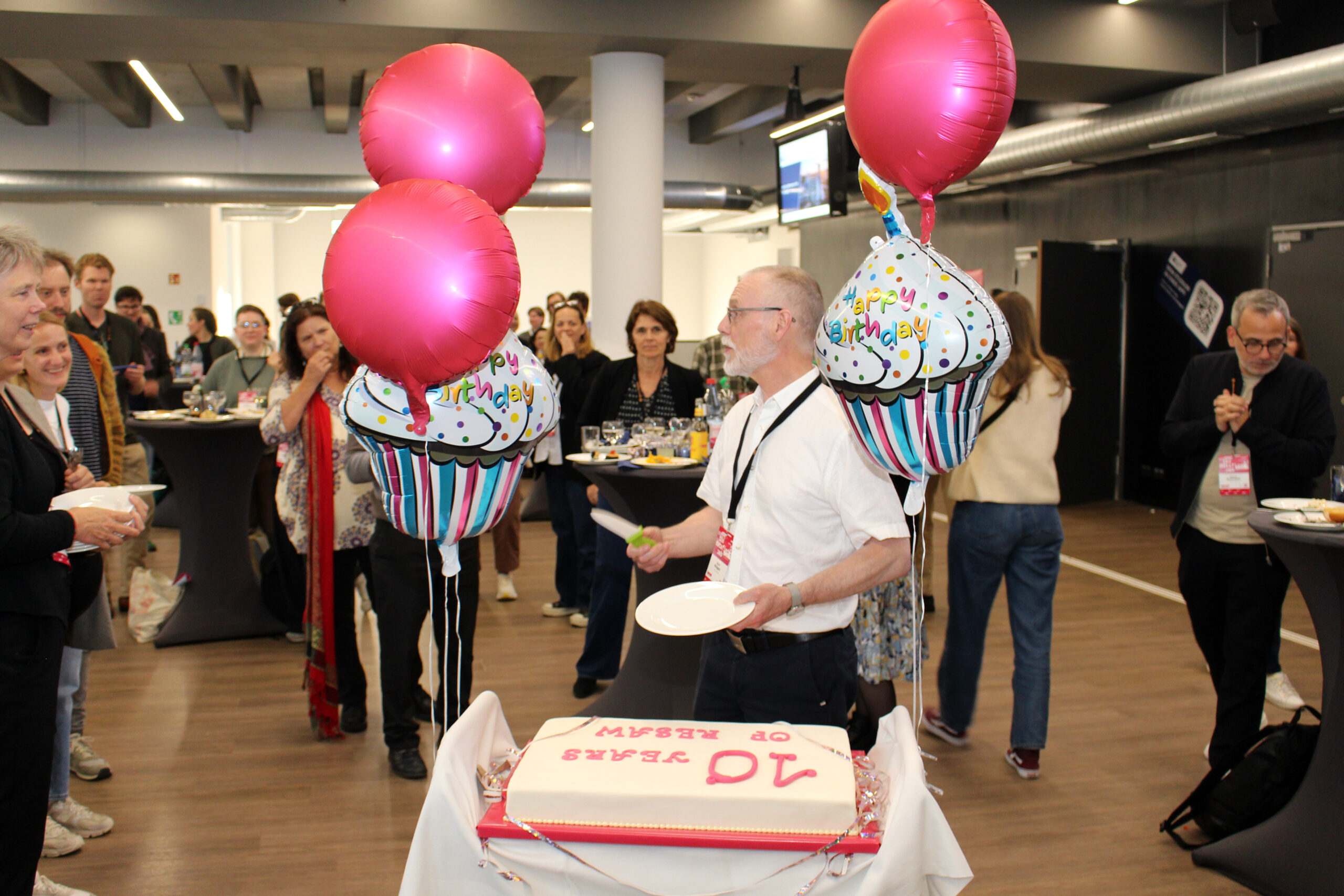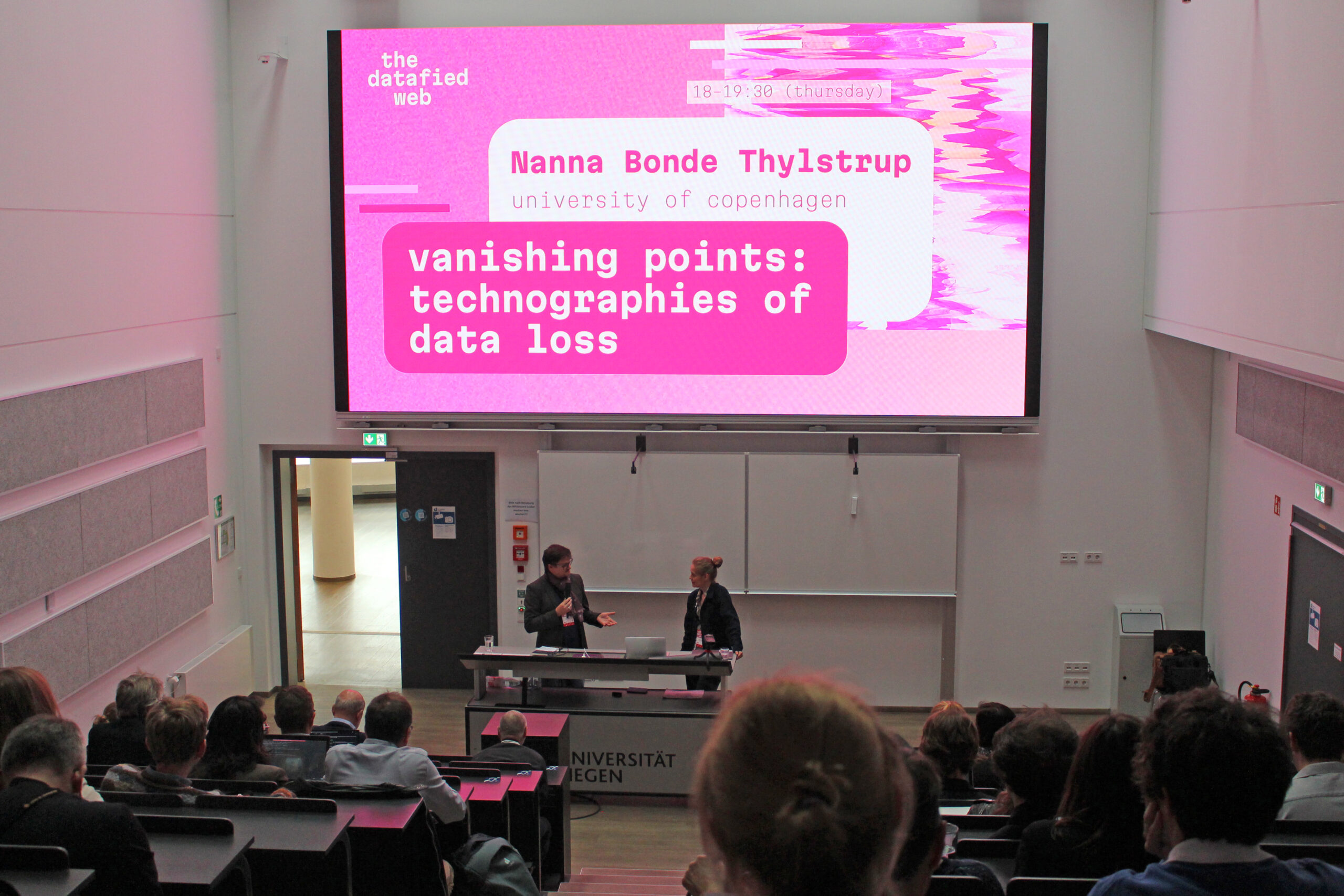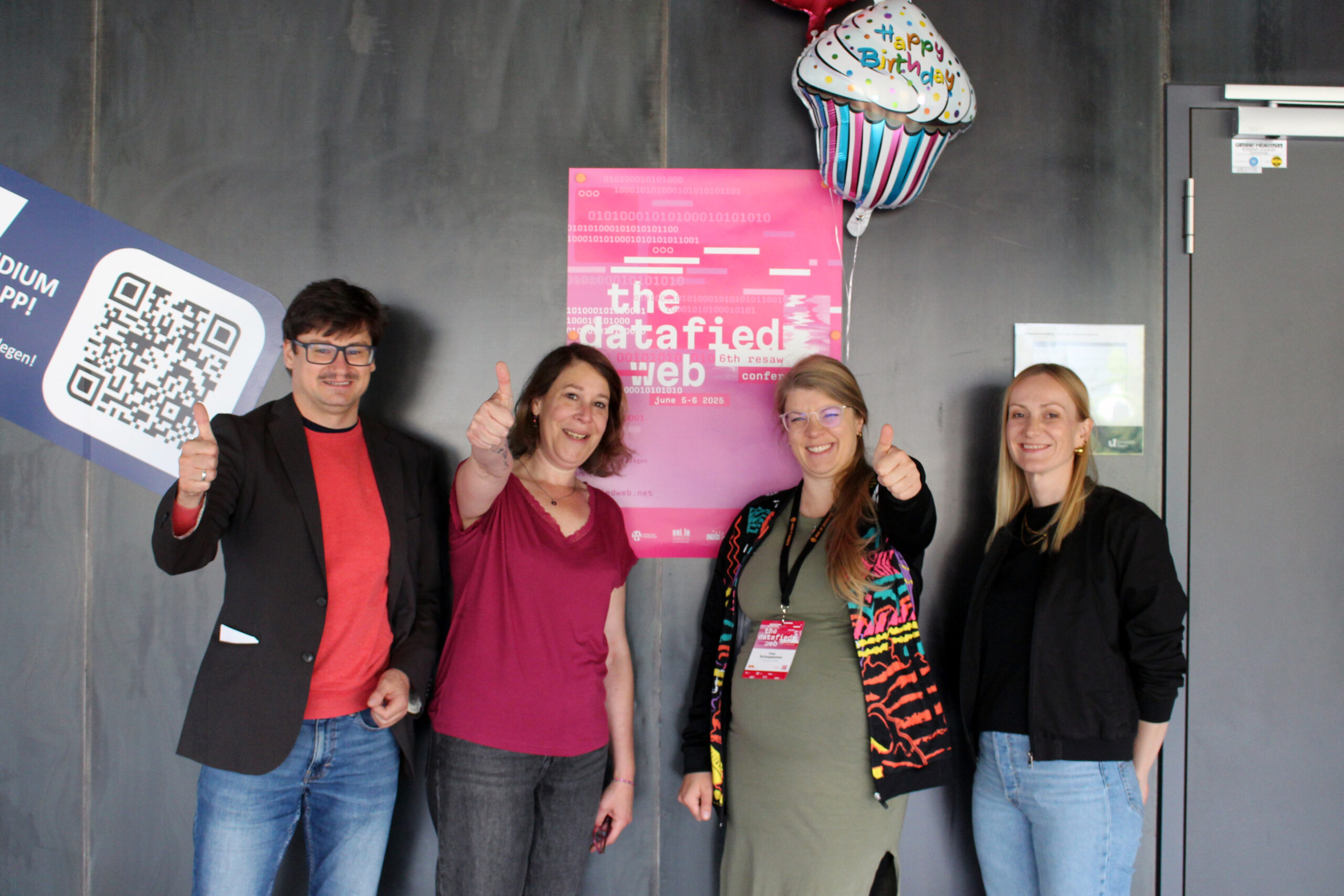Neuigkeiten
Interesse an Tätigkeit im wissenschaftlichen Umfeld?
Im Teilprojekt B06 „Un/erbetene Beobachtung in Interaktion: Smart Environments, Sprache, Körper und Sinne in Privathaushalten“ des DFG Sonderforschungsbereichs 1187 „Medien der Kooperation“ suchen wir eine studentische Hilfskraft (SHK) (m/w/d) zum 01. August 2025 zu folgenden Konditionen:
- Bis zu 10 Wochenstunden (genaue Stundenzahl nach Vereinbarung)
- Zunächst befristet für ein Jahr, mit der Möglichkeit zur Verlängerung
- Beschäftigung auf Grundlage des Wissenschaftszeitvertragsgesetzes
Ihre Aufgaben:
- Aufbereitung und Transkription von Feldnotizen sowie Teilnahme an der Auswertung des Datenmaterials
- Unterstützung bei Zuarbeit für die Forschung (u.a. Literaturrecherche und -verwaltung)
- Unterstützung bei der Durchführung von Veranstaltungen (u.a. in der Planung und praktischen Durchführung von Tagungen und Workshops)
- Mithilfe bei der Erstellung wissenschaftl. Publikationen (z.B. Korrektorat, Formatierungsarbeiten) )
Ihr Profil:
- Vorteilhaft ist die Vertrautheit mit empirischem Arbeiten
- Bereitschaft für flexible Arbeitszeiten
- Immatrikulation in einem (bevorzugt sozial- oder medienwissenschaftlichen) Bachelor- oder Master-Studiengang an einer deutschen Hochschule (bevorzugt Uni Siegen)
- Interesse an einer Tätigkeit im wissenschaftlichen Umfeld
- Strukturiertes Arbeiten, Freude an Teamarbeit, Eigeninitiative und Verantwortungsbewusstsein
→ vollständige Stellenausschreibung
Wir freuen uns auf Ihre Bewerbung bis zum 21.07.2025.
Bitte senden Sie Ihre Bewerbungsunterlagen (Anschreiben, tabellarischer Lebenslauf, Zeugnisse) in einer einzigen pdf-Datei an Herrn Strüver.
Weitere Infos zu dem Projekt erhalten Sie hier: https://www.mediacoop.uni-siegen.de/de/projekte/b06/
Ihre Ansprechperson:
Niklas Strüver, M.A.
niklas.struever[æt]uni-siegen.de
Zum vortechnologischen Medienbegriff
von Erhard Schüttpelz (Universität Siegen/SFB)
Wenn wir schon immer in einer Mediengesellschaft leben, was sind Medien dann wirklich? Erhard Schüttpelz geht dieser Frage in seinem neu erschienenen Buch Medium, Medium nach.
Über das Buch
Der Begriff des Mediums fällt heutzutage oft im Zusammenhang mit Technologie, dabei gibt es Medien schon länger in anderer vermittelnder Rolle zwischen Menschen und Nicht-Menschen. Schüttpelz verschiebt mit dieser Studie die Perspektive der Medienwissenschaften und stellt sich der Frage, was Medien überhaupt sind.
Verlagstext:
Wer an Medien denkt, hat meist ihre Ausformung in technischen Apparaten vor Augen, vom ersten Telegrafen bis zu den heutigen Kommunikations- und Speichermedien. Dabei gerät außer Acht, dass dem Begriff des Mediums auch eine schon vor der Technologie existierende Bedeutung zukommt, in der es jene bezeichnet, die zwischen Himmel und Erde, zwischen Lebenden und Toten, zwischen An- und Abwesenden vermitteln können. Wenn sich Medialität über Jahrtausende als Praxis fassen lässt, die Menschen und Nicht-Menschen verbindet, findet in der Moderne ein Bruch statt: Medien fallen mit Technologie in eins, und aus einer vielfältigen Fremdheit der Medien wird ein Wechselspiel von Prothese und Fernbedienung.
In seiner bahnbrechenden Studie verschiebt Erhard Schüttpelz die Perspektive der Medienwissenschaften: von der Waffe zum Behältnis, von der Schrift zur Sprache, von der Magie zum Ritual. Und er stellt die Frage, was Medien tatsächlich sind, wenn wir immer schon in Mediengesellschaften gelebt haben.
Über den Autor
Erhard Schüttpelz ist nach dem Studium der Germanistik, Anglistik, Ethnologie in Hannover, Exeter und Bonn und Forschungstätigkeiten in Oxford, Köln, New York, Konstanz und Wien seit 2005 Professor für Medientheorie an der Universität Siegen. Am SFB leitet er aktuell das Teilprojekt P02 „Medien der Praxeologie II: Anthropologie der Kooperation: Skill, Deixis, Wechselwirkung“.
Wie verändern sich alltägliche Haushaltspraktiken durch intelligente, sensorbasierte Medientechnologien?
von Tim Hector, Niklas Strüver, Stephan Habscheid und Dagmar Hoffmann (alle Universität Siegen, SFB)
In unserem neuen Working Paper (No. 36) präsentieren Tim Hector, Niklas Strüver, Stephan Habscheid und Dagmar Hoffmann erste Ergebnisse ihrer interdisziplinären Pilotstudie zur Gestaltung von Haushaltsökologien und -prozessen durch Smart Home Geräte. Die Studie ist Teil ihres Forschungsprojekts am SFB, in dem die Autor/innen gemeinsam die Domestizierung smarter Technologien als einen Fall kooperativer Produktion von Medien und Daten untersuchen.
Über das Working Paper
Das Working Paper präsentiert als Proof of Concept erste Ergebnisse einer interdisziplinären Pilotstudie, die mit Methoden der soziologischen und linguistischen Medienforschung der Frage nachgeht, wie sich alltägliche Haushaltspraktiken mit intelligenten, sensorbasierten Medientechnologien, die als multimodale Interaktionen beobachtet werden können, darstellen und verändern. Im Kontext des Projekts „B06 – Un-/erbetene Beobachtung in Interaktion: Smart Environments, Sprache, Körper und Sinne in Privathaushalten“ im Sonderforschungsbereich (SFB) „Medien der Kooperation“ wird die Domestizierung smarter Technologien als ein Fall der kooperativen Produktion von Medien und Daten – mit und ohne Konsens (Star und Griesemer 1989) – erforscht. Der Fokus der vorgestellten Pilotstudie liegt auf Mensch-Maschine-Kooperationen, bei denen eine mehr und minder bemerkte Erfassung von Verhaltens- und Umweltdaten durch Sensoren zur halbautomatischen Gestaltung von Haushaltsökologien und -prozessen beiträgt. Wir rekonstruieren und untersuchen Formen der Interaktion bzw. Kommunikation mit Interfaces dieser modernen Technologien und die sensorischen Orientierungen sowie körperlichen Praktiken der Nutzer*innen. Weiterhin von Interesse sind die räumlichen und materiellen Anordnungen, die für das soziale und kommunikative Arrangement sowie die Zweckmäßigkeit und Zielgerichtetheit des soziotechnischen Handelns mit den Geräten wesentlich sind. In dem vorliegenden Working Paper präsentieren wir explorative mediensoziologische und medienlinguistische Analysen einer mit smarten Geräten ausgestatteten Wohnumgebung sowie exemplarisch des Umgangs mit zwei Geräten: einem Amazon Echo Show (10. Gen.), das ist ein sich drehender Smart Speaker mit Voice User Interface, Kamera, Display, Video-/Touch Screen und kamerabasierter Bewegungserkennung, sowie einem smarten AirFryer, das ist eine Heißluftfritteuse mit Internetverbindung. Die Untersuchung zeigt, dass die Nutzer*innen mit ihrem menschlichen Sensorium, d.h. sowohl sozial-kognitiv als auch leiblich-körperlich, in die Mensch-Maschine-Interaktion eingebunden und in situ herausgefordert sind, verschiedene Entscheidungen zu treffen.
Über die Autor/innen
Tim Hector (Dr. des.) ist wissenschaftlicher Mitarbeiter im SFB 1187 „Medien der Kooperation“ an der Universität Siegen im Projekt B06 („Un/erbetene Beobachtung in Interaktion“). In seiner Promtoion hat er sich mit Smart Speakern im Gespräch beschäftigt. Zu seinen Forschungsinteressen zählen u.a. die Medienlinguistik, die Gesprächsforschung sowie die linguistische Praxeologie. Niklas Strüver (M.A.) ist wissenschaftlicher Mitarbeiter im Projekt B06 („Un/erbetene Beobachtung in Interaktion“) und Doktorand am SFB 1187 „Medien der Kooperation“. Er studierte Soziologie mit einem Schwerpunkt auf Techniksoziologie an der RWTH Aachen und schloss dort den Master of Arts ab. Seine Forschungsschwerpunkte liegen u.a. in den Bereichen Techniksoziologie, Science and Technology Studies sowie Platform Studies.
Stephan Habscheid (Prof. Dr.) ist Professor für Germanistik / Angewandte Sprachwissenschaft an der Universität Siegen. Im SFB 1187 „Medien der Kooperation“ leitet er gemeinsam mit Dagmar Hoffmann das Projekt B06 („Un/erbetene Beobachtung in Interaktion“). Er forscht u.a. zur Medienlinguistik und einer linguistischen Praxeologie sowie zu Sprache in Institutionen und Organisationen. Dagmar Hoffmann (Prof. Dr.) ist Professorin für Medien und Kommunikation / Gender Media Studies an der Universität Siegen. Im SFB 1187 „Medien der Kooperation“ leitet sie seit 2020 gemeinsam mit Stephan Habscheid das Projekt B06 („Un/erbetene Beobachtung in Interaktion“). Sie arbeitet u.a. zu digitalen Kompetenzen, Mediensozialisation und -aneignung sowie zu Bild- und Medienpraktiken im Social Web.
Über die Working Paper Reihe
Die Working Paper Series des SFB 1187 „Medien der Kooperation“ versammelt aktuelle Beiträge aus dem Umfeld der inter- und transdisziplinären Medienforschung. Die SFB Working Paper Series bietet die Möglichkeit einer Vorveröffentlichung und schnellen Verbreitung von am SFB laufenden oder ihm nahestehenden Forschungsarbeiten. Ziel der Reihe ist es, die SFB-Forschung einer breiteren Forschungsgemeinschaft zugänglich zu machen. Die Veröffentlichung in der Working Paper Series schließt die Publikation überarbeiteter Versionen desselben Beitrags in anderen Zeitschriften nicht aus. Beiträge von Postdocs und etablierten Wissenschaftlicher*innen werden begrüßt. Die Reihe versteht sich als Publikationsforum für die im SFB vertretenen Wissenschaftler*innen, Projekte und ihre laufende Forschung. Die Beiträge erscheinen im Open Access und in limitierter Printauflage. Wenn Sie einen Beitrag in der Working Paper Series veröffentlichen möchten, reichen Sie bitte Ihren Themenvorschlag in Form eines Abstracts (max. 300 Wörter) zusammen mit einer Kurzvita (max. 50 Wörter) ein. Für die Manuskripteinreichung beachten Sie bitte unser Styleguide.
Gefördert durch die Deutsche Forschungsgemeinschaft (DFG) – Projektnummer 262513311 – SFB 1187. Redaktionelle Verantwortung: Karina Kirsten, Universität Siegen & SFB 1187 Medien der Kooperation.
The 2025 RESAW Conference: Data, Communities, and Food … for Thoughts
by Valérie Schafer (University of Luxembourg & CRC 1187)
The 2025 edition of the RESAW conference marked a significant milestone: the tenth anniversary of a vibrant and constantly evolving academic community. Since its inception in 2015, this conference series has brought together researchers, archivists, and practitioners from diverse fields concerned with the history and present of the web. This year’s event was memorable, not only because of the anniversary, but also due to the remarkable richness of the exchanges, the diversity of its participants, and the depth of the contributions. RESAW joined forces with the Collaborative Research Centre (CRC 1187) Media of Cooperation, both coming together to study The Datafied Web and to preserve its histories.
About the RESAW conference and community
RESAW is the acronym for A REsearch Infrastructure for the Study of Archived Web Materials. The RESAW community is dedicated to working with digital cultural heritage and gathers every two years at the eponymous RESAW conference. RESAW was founded in 2012 with the goal of building a collaborative European research infrastructure for studying and working with web materials while fostering knowledge exchange across Europe. This presents significant challenges for both research and the archiving of web-based information and objects.
RESAW 2025 – The datafied Web at the University of Siegen
The conference drew close to one hundred participants from across Europe and North America. Among them were long-standing members of the community – some of whom have attended every edition since the beginning, as well as many newcomers, and notably from the CRC team at the University of Siegen. This mix created a dynamic and productive atmosphere, with new ideas and connections flourishing. It provided intellectual renewal and disciplinary cross-pollination.
The central theme, The Datafied Web, acted as a powerful conceptual anchor, encouraging reflection on how datafication has been and is reshaping the web, our methods, and our understanding of digital studies and web archives.
While many presentations were directly aligned with the theme, the conference also remained open to a wide array of topics beyond the scope of datafication. This flexibility is a longstanding strength of the event, allowing space for discussions of current research developments, methodological experimentation, and new discoveries in the fields of web archiving and web studies. Contributions ranged from updates on national and international web archiving initiatives to exploratory studies in platform studies or qualitative and quantitative methods.
RESAW set out to trace how the datafied web became the sensory media environment we now inhabit. A web of predictive suggestion, of per-user variation, of AI-generated aesthetic and ephemeral interfaces. A web where “what you see” is a product of where you clicked, what you hovered, which model you unknowingly trained. To study this web—and to preserve its histories—that is where the research agendas of Resaw and MoC come together. (Carolin Gerlitz, spokesperson of the CRC 1187)
A significant number of talks examined The Datafied Web through historical perspectives. These included case studies on the evolution of technologies such as the CD-ROM and Bluetooth, and their interaction with or transition into web-based platforms, shedding light on the frictions and continuities involved. Others focused on pressing current concerns, such as data surveillance, algorithmic governance, and the political economy of web and platform infrastructures.
The datafication of the web has brought about a decisive transformation of capitalism – and capitalist economies have in turn datafied the World Wide Web. Our current platform economies are based on the historical development of cookies, web advertising, and the measurement of public data. (Sebastian Gießman, head of the conference)
The interdisciplinary character of the conference was particularly evident this year. Approaches drawn from Web and Platform Studies, the History of Technology, Archival Studies, Digital Humanities, and Critical Data Studies were all present, and in fruitful dialogue. This interdisciplinarity was reflected not only in the themes discussed, but also in the methods employed: from close analysis to distant and scalable reading, and from infrastructure-focused studies to content-based investigations. Such methodological diversity illustrates the richness of the field and the necessity of hybrid approaches to fully grasp the complexities of the web’s past, present and future.
The keynote addresses were among the highlights of the conference. Nanna Bonde Thylstrup’s keynote offered a historically grounded presentation on the theme of data loss, linking it to broader narratives of memory, preservation, and forgetting in the digital age. Jonathan Gray’s keynote, by contrast, was more oriented toward the present and near future, addressing the stakes of open data, and the role of researchers in shaping ethical and inclusive data practices.
Beyond the formal sessions, a variety of pre-workshops, social events, and targeted meetings enriched the experience. Early-career researchers were given space to receive feedback and engage in mentoring dialogues. Pre-conference workshops offered hands-on methodological training and collaborative problem-solving. Roundtables tackled timely and strategic questions, such as the future of our scholarly RESAW network, and the challenges of studying datafication in the opening roundtable. (A personal conference trip report by Lesley Frew that focuses on her experience and some of the sessions is also available).
Of particular note was the attention paid to the epistemological and methodological implications of working with web data. Whether focusing on the politics of web archiving, the limits of data transparency, or the possibilities of algorithmic critique, many sessions interrogated not only what we know, but how we come to know it and what remains excluded or erased in the process. Case studies drawn from diverse geographical, historical and linguistic contexts further enriched these discussions, reminding us of the web’s heterogeneity and the need for grounded, situated and reflexive perspectives.
In conclusion, the 2025 conference was more than just a commemoration of ten years of scholarly exchange and conferences. It was a powerful reaffirmation of the value of community, dialogue, and interdisciplinary collaboration in the face of a rapidly evolving digital landscape and more generally world. The themes explored, the connections made, and the questions raised will no doubt continue to inspire work in the years to come.
We would like to sincerely thank again all the local organisers, all the participants who made this edition such a success, as well as the DFG and FNR, the University of Siegen, the CRC Media of Cooperation, and the C2DH at the University of Luxembourg for their support to this event.
The 2025 RESAW conference was organized by the Collaborative Research Centre 1187 “Media of Cooperation” at the University of Siegen in cooperation with the Centre for Contemporary and Digital History (C²DH) at the University of Luxembourg. The conference is funded by the Deutsche Forschungsgemeinschaft (DFG, German Research Foundation) and the Luxembourg National Research Fund (FNR).
More
Press release by the University’s Press Office →
Conference report by Lesley Frew →
2 Kurzzeitstipendien am SFB zu vergeben
Der SFB vergibt wieder zwei Kurzzeitstipendien an Wissenschaftler*innen, die im Bereich digitaler Medien, Sensing und Sensorik, Datenpraktiken und KI forschen und Interesse an einer längerfristigen Zusammenarbeit mit dem SFB haben.
Kurzinformationen
- Stipendienbeginn: 1. Oktober 2025
- Laufzeit: 9-12 Monate
- Grundbetrag des Stipendiums: 1.365,- EUR (Höchstsatz der DFG)
- Sachkosten¬zuschuss und ggf. Kinderzulage werden zusätzlich gezahlt
Über den SFB 1187 „Medien der Kooperation“
Der SFB ist ein interdisziplinärer Forschungsverbund, bestehend aus 19 Teilprojekten und mehr als 60 Wissenschaftler*innen aus Medienwissenschaft, Ethnologie, Soziologie, Informatik, Linguistik, Ubiquitous Computing, Science and Technology Studies, Erziehungs-, Rechts- und Ingenieurswissenschaften.
Der SFB wird seit 2016 von der Deutschen Forschungsgemeinschaft (DFG) gefördert. Im Zentrum der Forschung steht die Entstehung, Gestaltung und Nutzung digitaler, datenintensiver Medien, die der SFB als kooperativ erarbeitete Kooperationsbedingungen versteht. In der ersten Förderphase (2016-2019) reagierte der SFB auf die Relevanz von sozialen Medien und Plattformen, in der zweiten Phase (2020-2023) standen datenintensive Medien und Datenpraktiken im Mittelpunkt. Die aktuelle dritte Phase (2024-2027) widmet sich dem Zusammenspiel von Sensormedien und Künstlicher Intelligenz.
Über das Kurzstipendienprogramm des SFB erhalten nationale und internationale Doktorand*innen die Möglichkeit, ihr Forschungsprojekt im SFB weiterzuentwickeln, beteiligte Forscher*innen der Teilprojekte kennenzulernen und sich mit diesen auszutauschen. Thematisch sollen die Forschungsprojekte der Stipendiat*innen im Umfeld der Teilprojekte des SFB angelegt sein, damit ihre Arbeit von den Projekten unterstützt werden kann. Organisatorisch sind die Stipendiat*innen dem integrierten Graduiertenkolleg (MGK) des SFB zugeordnet und profitieren von seinem strukturierten Qualifizierungskonzept. Der SFB bietet Stipendiat*innen ein internationales Umfeld für interdisziplinäre Medienforschung sowie ein umfassendes Veranstaltungsprogramm und Methodentraining u.a. im Bereich ethnografischer, digitaler, sensorbasierter, linguistischer sowie KI-basierter Methoden.
Nähere Informationen zu den Schwerpunkten und Teilbereichen des SFB finden Sie unter: https://www.mediacoop.uni-siegen.de.
Ihr Profil
- Einschlägiger, überdurchschnittlicher Studienabschluss in einer der am SFB beteiligten oder verwandten Disziplinen, bevorzugt in der Medien- und Kulturwissenschaft, Soziologie oder im Bereich der Sozio- oder Wirtschaftsinformatik, Human-Computer-Interaction oder Informationssysteme (Master, Magister, Diplom oder Lehramt/Staatsexamen Sek. II)
- Eigenes Forschungsvorhaben in einer der o.g. Disziplinen im Themenbereich des SFB. Idealerweise können Sie das Projekt einem der Teilbereiche des SFB – Infrastrukturen, Öffentlichkeiten oder Praxeologie – zuordnen
- Interesse an Methoden der Medienforschung, der Analyse von Datenpraktiken sowie Affinität zu interdisziplinären Arbeits¬weisen
- Bereitschaft sich am internationalen Veranstaltungsprogramm des SFB und des MGK zu beteiligen
- Sehr gute deutsche und englische Sprachkenntnisse in Wort und Schrift
Ihre Aufgaben
Erwartet werden:
- Regelmäßige Teilnahme und inhaltliche Mitwirkung am Veranstaltungs- und Qualifizierungsprogramm des MGK (Kolloquien, Work¬shops, Summer Schools, Methodenwerkstätten, interdisziplinäre Kleingruppen)
- Präsentation von Zwischenergebnissen des Forschungsvorhabens innerhalb des MGK-Kolloquiums
Zur Bewerbung
Ihre Bewerbungsunterlagen (Motivationsschreiben, Lebenslauf, Zeugniskopien, 5-10-seitige Skizze einer Projektidee) senden Sie bitte auf Englisch bis zum 25. Juni 2024 zusammengefasst in einer PDF-Datei (max. 5 MB) per E-Mail an dominik.schrey@uni-siegen.de. Bitte beachten Sie, dass Gefährdungen der Vertraulichkeit und der unbefugte Zugriff Dritter bei einer Kommunikation per unverschlüsselter E-Mail nicht ausgeschlossen werden können.
Über die Universität Siegen
Die Universität Siegen ist eine interdisziplinär ausgerichtete und weltoffene Universität mit aktuell rund 18.000 Studierenden und einem Fächerspektrum von den Geistes-, Sozial- und Wirtschaftswissenschaften bis hin zu Natur-, Ingenieur- und Lebenswissenschaften. Mit über 2.000 Beschäftigten zählen wir zu den größten Arbeitgebern der Region und bieten ein einzigartiges Umfeld für Lehre, Forschung und Weiterbildung.
Chancengerechtigkeit und Diversity werden an der Universität Siegen gefördert und gelebt. Bewerbungen von Frauen sind uns ausdrücklich willkommen und werden gemäß Landesgleichstellungsgesetz besonders berücksichtigt. Gleichermaßen wünschen wir uns Bewerbungen von Personen mit unterschiedlichstem persönlichen, sozialen und kulturellen Hintergrund, Menschen mit Schwerbehinderung und diesen Gleichgestellten.
Informationen über die Universität Siegen finden Sie auf unserer Homepage www.uni-siegen.de.
Informationen über die Universität Siegen finden Sie auf unserer Homepage www.uni-siegen.de.
Kontakt
Dr. Dominik Schrey
Tel.: +49(0) 271 740-4664
E-Mail: dominik.schrey[ae]uni-siegen.de
Synthetic Imaginaries: The Cultural Politics of Generative AI

University of Siegen | 8–12 September 2025 | extended deadline for submision: 30 June 2025
Synthetic Imaginaries: The Cultural Politics of Generative AI is an international event that will explore the cultural, political, and methodological dimensions of generative AI and synthetic media through a combination of conference talks, hands-on workshops, and collaborative projects. Topics include deepfakes, avatars, cultural biases in training data, feminist and postcolonial critiques, and the aesthetics of AI-generated content.
About | Program Highlights | Proposal Submission | Venue | Program | Contact
About the Autumn School
The rise of artificial intelligence (AI), big data processing, and synthetic media has profoundly reshaped how culture is produced, made sense of, and experienced today. To ‘synthesize’ is to assemble, collate, and compile, blending heterogeneous components into something new. Where there is synthesis, there is power at play. Synthetic media—as exemplified by the oddly prophetic early speech synthesizer demos—carry the logic of analog automation into digital cultures where human and algorithmic interventions converge. Much of the research in this area—spanning subjects as diverse as augmented reality, avatars, and deepfakes—has revolved around ideas of simulation, focusing on the manipulation of data and content people produce and consume. Meanwhile, generative AI and deep learning models, while central to debates on artificiality, raise political questions as part of a wider social ecosystem where technology is perpetually reimagined, negotiated, and contested: What images and stories feed the datasets that contemporary AI models are trained on? Which imaginaries are reproduced through AI-driven media technologies and which remain latent? How do synthetic media transform relations of power and visibility, and what methods—perhaps equally synthetic—can we develop to analyze these transformations?
The five-day event at the University of Siegen—organized by the DFG-funded Collaborative Research Centers Media of Cooperation and Transformations of the Popular together with the Center of Digital Narratives in Bergen, the Digital Culture and Communication Section of ECREA and the German National Research Data Infrastructure Consortium NFDI4Culture—explores the relationship between synthetic media and today’s imaginaries of culture and technology, which incorporate AI as an active participant. By “synthetic,” we refer not simply to the artificial but to how specific practices and ways of knowing take shape through human-machine co-creation. Imaginaries, in turn, reflect shared visions, values, and expectations—shaping not only what technologies do but how they are perceived and made actionable in everyday life.
The event opens with a one-day conference and moves into hands-on workshops and collaborative projects. With multiple opportunities for exchange across disciplines, we encourage especially early-career researchers and PhD students to present their ideas during the conference and join a project led by international facilitators and data designers. We invite submissions of short abstracts (max. 500 words) for presentations engaging with questions and provocations related—but not limited—to topics such as:
Critical data studies perspectives on AI: how data infrastructures, labeling, and curation shape the outputs we call “synthetic”; Cultural afterlives of training data: how racialized, gendered, or colonial imaginaries persist in synthetic media outputs; Methodological uses of GenAI: the politics that we buy in when repurposing AI as a method, from inherited bias to epistemic tensions; Synthetic personhood and likeness: exploring deepfakes, AI-generated avatars, and the power of (in)authenticity; Online cultures and platforms: how AI-generated content circulates across platforms—from memes and art to fan fiction, music, and poetry; Postcolonial and feminist critiques of AI: challenging universalist assumptions in generative models and interrogating whose knowledge is made (in)visible; Clichés, formulas, and repetition in GenAI outputs: how AI-generated stories and images rely on familiar tropes, visual styles, and narrative conventions; The aesthetics of noise in AI-generated content: repetition, glitch, randomness, and their role in producing or disrupting meaning; GPTs as infrastructural components: how generative pretrained transformers operate as configurable, customizable, and task-oriented agents embedded in platform infrastructures; Prompting and/as probing: prompting as a form of critical intervention, shaping co-authorship, sense-making, and research design; The ethics of training AI: from historical records and religious texts to indigenous cosmologies and oral traditions—what are the implications of using culturally sensitive knowledge to train generative models? Generative AI and Memory: synthetic media as a means of reimagining the past—through deepfake testimonies, interactive historical simulations, and other forms of computational memory-making; Generative AI in activist contexts: can AI be used for resistance or reimagining community—in the face of its environmental footprint and complicity in extractive systems?
Program highlights
The event blends three complementary formats:
Mix questions!
Monday, 8 September
Day one begins with a keynote by Jill Walker Rettberg and opens space for emerging questions—think of it as an idea hub. Accepted abstracts will be grouped into thematic sessions curated by the organising team. Presenters will be connected via email ahead of time to coordinate their contributions. Each presentation will be set to 10 minutes to allow ample time for discussion, collective thinking, and exchange. The emphasis is on dialogue, not polished conclusions.
Mix methods!
Tuesday, 9 September-Thursday, 11 September
The next three days—featuring a workshop by Gabriele De Seta and an artistic intervention by Ángeles Briones and DensityDesign Lab—are about exploring new methods—hands-on! We invite you to join a team of interdisciplinary scholars and data designers in probing new methodological combinations. Each of our project teams will present a research question alongside a specific method to be collaboratively explored. Participants will not only learn how to design prompts and work with AI-generated text and images but also how to critically account for genAI models as platform models. All projects draw on intersectional approaches, combining qualitative and quantitative data to explore the synthetic dimensions of AI agency—whether as content creator, noise generator, hallucinator, research collaborator, data annotator, or style imitator. Please bring your laptops. The project titles will be announced soon.
Synthesize!
Friday, 12 September
The final day is dedicated to sharing, reflecting, and synthesizing the questions, methods, and insights developed throughout the week. Project teams will present their collaborative processes, highlight key takeaways, and discuss how their ideas and approaches shifted through hands-on experimentation with methods.
Proposal Submission
Please submit your proposal (max. 500 words) outlining how your work aligns with the event’s theme by 30.06.2025, using this form. Please note that the number of participants will be limited to maintain focused and engaging discussions. All submissions will be peer-reviewed.
The event is free of charge, though attendees are responsible for arranging and covering their travel and accommodation in Siegen. Limited travel support is available (two to three stipends ranging from €500 to €700). Early-career researchers and PhD students are invited to apply; stipends will be awarded by the NFDI4Culture consortium based on the strength of the justification, particularly concerning critical ethical engagement with AI research data, as well as the distance and cost of travel. Short summaries of the presented work will be published on the NFDI4Culture website.
A certificate of participation will be issued for both the conference presentation and the hands-on workshop sessions.
Updated Timeline with extended deadline:
Submit your proposal by 30 June 2025.
Notification of acceptance by July 15 2025.
Registration by August 1 2025.
Venue
Universität Siegen
Campus Herrengarten
AH-A 217/18
Herrengarten 3
57072 Siegen
Contact
Dr. Elena Pilipets
elena.pilipets[at]uni-siegen.de
ecreadigitalculture[æt]gmail.com
The Autumn School is organized by the DFG-funded Collaborative Research Centers 1187 Media of Cooperation and 1472 Transformations of the Popular together with the Center of Digital Narratives in Bergen, the Digital Culture and Communication Section of ECREA and the German National Research Data Infrastructure Consortium NFDI4Culture.
„The datafied Web“ und die Anfänge des Webtrackings
Erinnern Sie sich…
… an die Anfänge des Internets in den 90er Jahren?
… die Einführung von Webanalysen?
… an die digitalen Pioniere, die begannen unsere Online-Aktivitäten zu tracken?
… die Neuheit, Webseitenbesuche in Echtzeit zu messen?
… an die auffälligen Grafiken, die zur neuen ‚Währung‘ im Netz wurden?
… die Anfänge von Unternehmen wie Webtrends, Urchin und DoubleClick?
Mit über 40 Vorträge widmet sich die kommende RESAW Tagung 2025 dem Thema „The datafied Web“. Im Fokus stehen die frühen Webentwicklung und die Wurzeln des datengetriebenen Webtrackings. Mehr als 70 Forschende aus 11 Ländern kommen am 5. & 6. Juni am Sonderforschungsbereich 1187 „Medien der Kooperation“ der Universität Siegen zusammen und gestalten ein vielfältiges Tagungsprogramm.
Über die RESAW Tagung und Fachcommunity
RESAW ist das Acronym für A Research Infrastructure for the Study of Archived Web Materials. Die RESAW-Community widmet sich der Arbeit mit dem digitalen Kulturerbe und trifft sich alle zwei Jahre auf der gleichnamigen RESAW-Konferenz. RESAW wurde 2012 mit dem Ziel gegründet, eine kollaborative europäische Forschungsinfrastruktur für die Erforschung von und mit Web-Materialien aufzubauen und den europäischen Wissensaustausch zu fördern.
Webinhalte sind ephemere Objekte: Sie sind kurzlebig, kontextgebunden oder anlassspezifisch. Die durchschnittliche Lebensdauer einer Webseite beträgt gerade einmal zwei Monate. Dies stellen Forschung und Archivierung von webbasierten Informationen und Objekten vor immense Herausforderungen.
RESAW 2025 – The Datafied Web an der Siegen Universität
Die sechste RESAW-Konferenz widmet sich der Suche nach den historischen Wurzeln des datengetriebenen Paradigmas in der Web-Entwicklung. Dabei werden Trends, Entwicklungslinien und Genealogien eines datafizierten und metrisierten Webs sowie des Aufkommens plattformgetriebener Ökosysteme näher analysiert. Eine Untersuchung des historischen Kontexts, der Ästhetik und der Rolle von Webzählern, Analysetools, mobiler Sensorik und anderer Metriken kann dazu beitragen, ein tieferes Verständnis von Online-Interaktionen, vergangenen Öffentlichkeiten und Zielgruppen sowie deren (mitunter problematischen) Entwicklungen zu gewinnen.
Das Thema „Das datafizierte Web“ wirft auch Fragen zu Methoden und (Web-)Archiven auf, die es ermöglichen, diese Entwicklung zu erforschen: Welche Herausforderungen und Methodologien gibt es beispielsweise bei der Archivierung des metrisierten und zunehmend mobilen Webs, einschließlich der Back-End-Infrastruktur? Darüber hinaus lädt das Thema dazu ein, die historische Entwicklung der Datenerfassung und die Evolution von Praktiken der Datenüberwachung im Web nachzuzeichnen. Ergänzend dazu sind Fragen zur historischen Entwicklung von Tracking-Mechanismen, Cookies und der Entstehung digitaler Fußabdrücke relevant, ebenso wie die Evolution von Unternehmen, die auf Metriken angewiesen sind, sowie die Entwicklung finanzialisierter Webräume und deren Auswirkungen.
Die Konferenz blickt dabei aus der historischen Webanalyse heraus auf medialisierte Umwelten und stellt die Frage: Wie hat das datafizierte Web die sensorischen Medienumgebungen geschaffen, in denen wir heute leben?
Highlights der RESAW 2025
Anlässlich des 10-jährigen Bestehens der RESAW-Konferenz findet ein von Niels Brügger organisierte Podiumsdiskussion statt. Vorzumerken ist der Freitagnachmittag am 6. Juni.
Besondere Highlights der diesjährigen Jahrestagung sind die Keynotes am Donnerstagabend und Freitagmorgen von Nanna Bonde Thylstrup, Associate Professor in Modern and Digital Culture an der University of Copenhagen und Jonathan Gray, Reader in Critical Infrastructure Studies, Department of Digital Humanities am King’s College in London. Nanna Bode Thystrup wird über „Vanishing points: technographies of data loss“ sprechen und sich kritisch mit Datenverlust und technographischen Zugängen zum Verschwindens auseinandersetzen. Jonathan Gray wird in seiner Keynote „Public data cultures“ die rechtlichen und technischen Konventionen offener Daten historisieren.
Gemeinsam verfolgen die Keynote-Vortragenden das Ziel, den Begriff und die Praktiken von Daten neu zu betrachten: Webdaten sind kulturelles Material, Medium der Partizipation und Ort transnationaler Koordination.
Insgesamt 22 Panels bieten bei der RESAW25 Raum für über 70 Vorträge von Siegener und internationalen Wissenschaftler*innen – unter anderem aus der Partneruniversität in Luxembourg sowie aus den Niederlanden, Frankreich, Vereinigtes Königreich, Schweden, Dänemark, Belgien, den USA, Portugal und Israel.
Am ersten Tag beleuchten Panels u.a. die Themenfelder rund um Plattformen und Social Media, Monetarisierungs- und Archivpraktiken im Web sowie den Umgang mit Dataverlust. Am zweiten Tag stehen u.a. das Skybox Forschungsprogramm, die Geschichte von Plattformen und Forschungsmethoden im Fokus.
Die Tagung verspricht spannende Einblicke in aktuelle Forschungsfragen rum um Trends, Entwicklungslinien und Genealogien eines datafizierten und metrisierten Webs sowie einen kritischen Dialog über die Herausforderungen und Chancen, die mit dem Aufkommen palttformgetriebener Ökosysteme einhergehen.
The 2025 RESAW Konferenz wird organisiert vom Sonderforschungsbereich 1187 „Medien der Kooperation“ der Universität Siegen in Kooperation mit dem Centre for Contemporary and Digital History (C²DH) an der Universität Luxembourg. Die Konferenz wird gefördert von der Deutschen Forschungsgemeinschaft (DFG) und dem Luxembourg National Research Fund (FNR).
Wie „smart“ ist Ihr Zuhause?
Eine Forschungsstudie von Stephan Habscheid, Dagmar Hoffmann, Tim Hector, Niklas Strüver (alle Universität Siegen, SFB 1187)
Das Projektteam von B06 „Un-/erbetene Beobachtung in Interaktion“ sucht Teilnehmer*innen für ihre Forschungsstudie zu „Smart Homes“. Sie haben ein „Smart Home“ oder wollen sich bald erste Smart Home-Geräte anschaffen? Dann nehmen Sie an der Forschungsstudie teil!
→ Zur Website des Teilprojekts B06

Über die Studie
Wir wollen mehr über Ihren ‚smarten‘ Alltag erfahren. Um nähere Einblicke in den Alltag mit smarten Geräten zu erhalten, möchten wir Sie bei der Einrichtung und Nutzung Ihrer Smart Home-Geräte begleiten und auf Video aufzeichnen. Die Ergebnisse und Daten nutzen wir ausschließlich zu Forschungszwecken. Die gesammelten Daten werden nach höchsten datenschutzrechtlichen Standards vertraulich verarbeitet. Bei Veröffentlichungen wird auf eine strenge Anonymisierung bzw. Verfremdung der Teilnehmer*innen geachtet.
Für die Studie suchen wir
- Haushalte mit Smart Speaker, smarten Küchengeräten (z.B. ein Thermomix), vernetzter Elektronik (z.B. Glühbirnen, Thermostate, Türschlösser oder Steckdosen), digitalen Energiekontrollen für ein Solarpanel oder ähnlichen Geräten/Anwendungen
- Haushalte, die noch keine solchen Geräte einsetzen, aber die Anschaffung planen und uns bei der Einrichtung und Nutzung dessen mitnehmen möchten.
Bei einer Teilnahme bieten wir Ihnen eine Aufwandsentschädigung, die je nach Umfang der Teilnahme zwischen 30 und 180 Euro betragen kann.
Bei einer Teilnahme erwartet Sie:
- Die Video-Aufnahme der Nutzung von Smart Home-Geräten in bestimmten Situationen, z.B. beim Kochen und Spielen, bei alltäglichen Unterhaltungen oder bei Besuchen von Freunden und Bekannten.
- Wenn möglich die Video-Aufnahme der Ersteinrichtung von Smart Home-Geräten (Auspacken, Installation, Verbinden mit dem Smartphone und Platzierung in der Wohnung).
- Die Erfassung aller Smart Home-Anwendungen in Ihrer Wohnung sowie verschiedene Interviews mit Ihnen sowie mit anderen Haushaltsmitgliedern.
- Um die Verbindung zwischen dem Smart Home-Gerät und Ihrem Smartphone zu ermitteln soll außerdem in bestimmten Situationen ein Screen-Recording durchgeführt werden.
Kameras und Audio-Aufnahmegeräte werden von uns zur Verfügung gestellt.
Teilnahmevoraussetzungen: Alle Mitglieder Ihres Haushaltes müssen mindestens 16 Jahre alt sein.
Kontakt
Bei Fragen schreiben Sie gerne eine Mail an das Projektteam: ipa-studie[æt]uni-siegen.de.
30„digital:gender – de:mapping affect. eine spekulative kartografie“
herausgegeben von Julia Bee (Ruhr-Universität Bochum), Irina Gradinari (Fernuniversität Hagen) und Katrin Köppert (Hochschule für Grafik und Buchkunst Leipzig)
Wie beeinflussen digitale Objekte unser kritisches Denken, wenn sie unsere Emotionen ansprechen? Julia Bee vom SFB 1187 geht dieser Frage zusammen mit Kolleginnen in der 2025 erschienenen Publikation digital:gender – de:mapping affect. eine spekulative kartografie nach.
Über das Buch
Die Publikation untersucht Schnittstellen zwischen Gender Studies und Objekten der digitalen Medienkultur: Memes, Apps, Posts. Es werden spekulative Experimente durchgeführt, um anhand einzelner Objekte Einstiegspunkte in die zeitgenössischen Konstellationen der digitalen Medienkultur und gendertheoretischen Ansätze zu erproben. Gefühl und Affekt spielen dabei eine Schlüsselrolle: Wenn unsere Emotionen durch künstlerische und mediale Objekte angesprochen werden, verändert sich unser kritisches Denken über sie. Die „Kartografie“ der zeitgenössischen digitalen Medienkultur stellt somit eine situierte Methode dar.
Über die Herausgeberinnen
Julia Bee ist Professorin für Gender Media Studies unter besonderer Berücksichtigung von Diversität an der Ruhr-Universität Bochum und fokussiert sich in ihrer Forschung auf intersektionale Ansätze und Gender Medien Theorie. Sie leitet das Projekt B09 „Fahrradmedien: Kooperative Medien der Mobilität“ am Sonderforschungsbereich.
Irina Gradinari ist Juniorprofessorin für Gender Studies an der FernUniversität Hagen. Katrin Köppert ist Juniorprofessorin für Kunstgeschichte und populäre Kulturen an der Hochschule für Grafik und Buchkunst Leipzig.
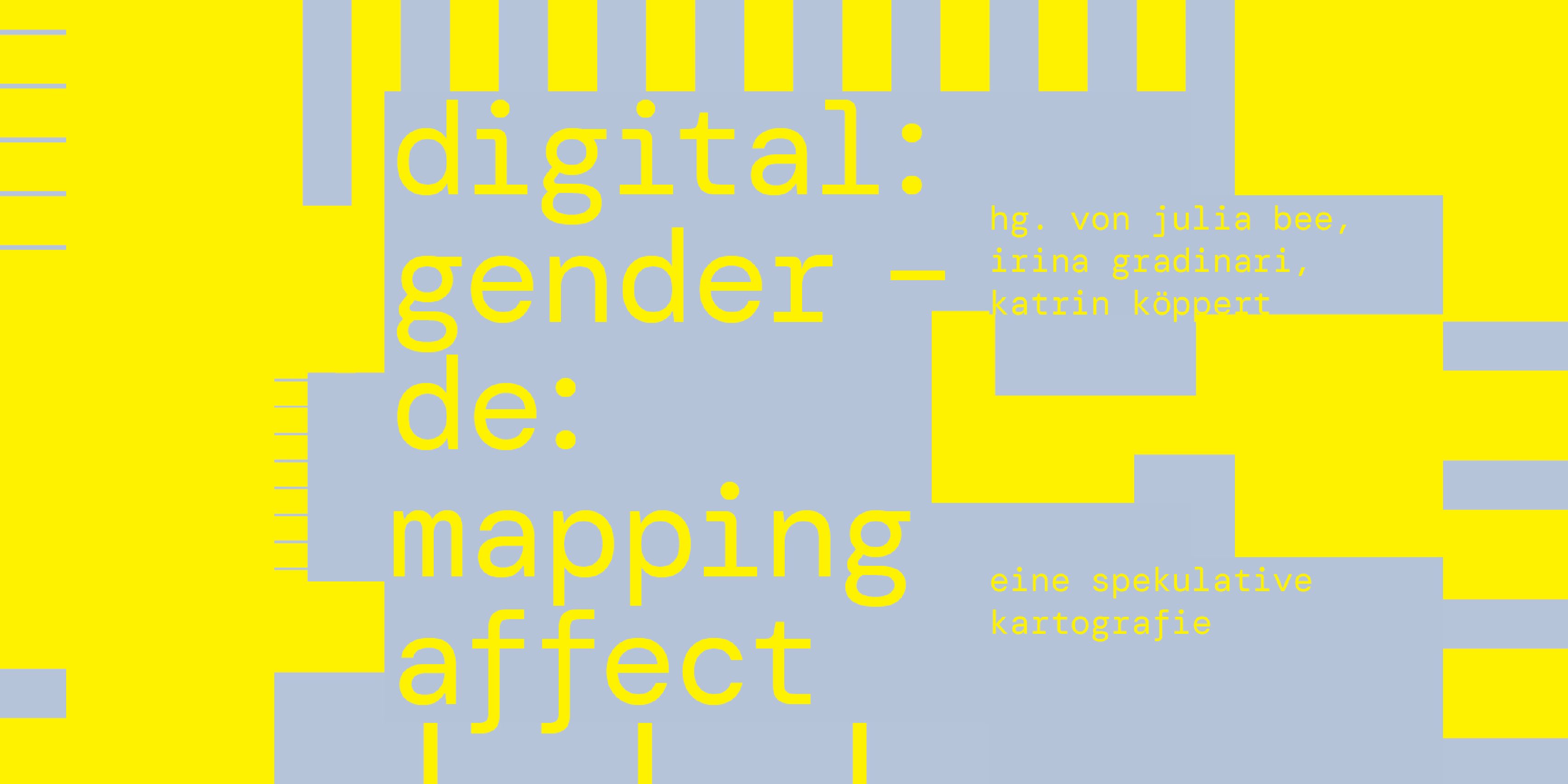
1 / 15
